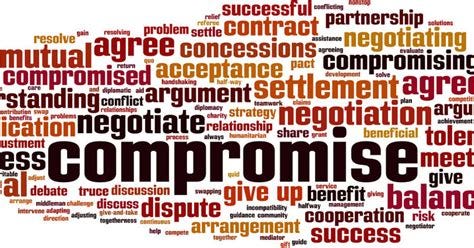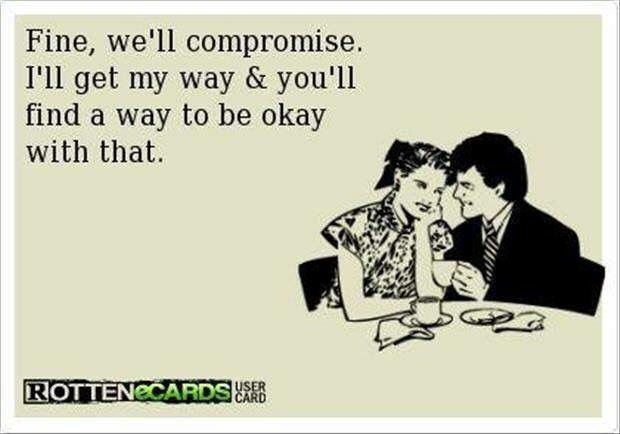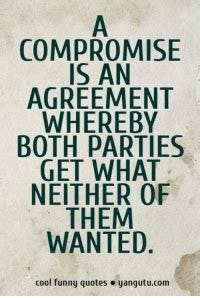Crossing the Aisle: Learning to Eat My Own Words
How Facing My Own Hypocrisy Gave Me A Reality Check
All government, indeed every human benefit and enjoyment, every virtue, and every prudent act, is founded on compromise and barter. - Edmund Burke
Story-at-a-glance:
Compromise vs. Caving In: The essay explores how the concept of compromise is often misunderstood. While compromise is seen as a virtue—finding common ground and working together—it's frequently mistaken for giving in or selling out.
Personal Revelation: The author shares a personal epiphany about her own expectations of political negotiation. She realized they only wanted politicians to compromise when it aligned with her personal views, highlighting a common double standard in how we perceive political actions.
The Call for Mature Politics: The essay argues that for political progress, we need to embrace compromise more openly. It suggests that both citizens and politicians should be willing to give a little and accept that real change often requires balancing differing perspectives.
I’d like to share a realization I had that held up a mirror to me and smacked me in the face with a not a very attractive reflection. It’s a lesson I haven’t forgotten, the energy of which I have applied to a variety of circumstances since.
The problem
For years, I’d been complaining about the deadlocked Congress we have in the U.S. that can never seem to get anything done on behalf of the American people. They seem to be able to pass things dealing with arms, war, bailing banks and big business out, and financing other countries, but rarely do I feel they’re actually serving me. The truth is that they feel like they’re serving themselves, their buddies, and those they owe favors to.
Bring back courage
I’m old enough to remember the days when politicians worked together across the aisle. Senator John McCain is one that stands out in my memory. I’m not a republican but I deeply respected that he seemed to stand for what he believed in even when he was caught between the crosshairs of his party and the democrats. That took a lot of courage.
Senator Joe Manchin would be the current day equivalent, in my eyes, as far as seeming to be thoughtful about what he’s voting for and why, instead of just voting with his party. What I have appreciated about him is that, when he votes a way that I disagree with, he can explain in everyday language why he voted the way he did. I may not agree with his perspective, but at least I understand why he voted that way.
In the olden days, working across the aisle didn’t mean that they didn’t argue or disagree. They did that quite fervently, but somehow they were still often able to put their ideals aside to come to some kind of…and I know this is a dirty word these days so shield your eyes and ears…
COMPROMISE
Compromise: a settlement of differences by mutual concessions
Definition from Dictionary.com
P.S. Compromise used to be called negotiation
Give a little, get a little
I’m not sure when compromise become such a dirty 10 letter word of a relic, but I think we should bring it back because what we’re doing isn’t working. My sense is that, over time, politicians, political parties, corporations, lobbyists, and religions got more and more determined to win at all costs and started to put the squeeze on something that is essential to keep our country moving in positive directions - negotiation and good faith exchanges aka “give a little, get a little”.
With the guardrails changed, the regular everyday citizens of this country started to be sold out with the either you’re with us or against us attitudes. So now the titans of politics battle it out making the term “compromise” one of the dirtiest words that shall not be spoken or acted upon. It’s gotten homogenized with newer terms like flip-flopping, giving in, or caving with little thought to the more heroic nature where sacrifices are sometimes made for the greater good of the country.
People often say they want compromise, but when they see it in action, they often perceive it as “caving in”. We like the idea of fair exchanges in general, but on most political issues, we want our side to come out on top.
A cynical take is that we support negotiating as long as it's the other side making the concessions. I might be wrong, but I see the cynical take as more of the norm in people these days.
My realization
For a very long time, I’ve said that I’d like to see more politicians working across the aisle to get us out of this republican vs democrat quagmire to bring more good things to this country’s citizens.
I live in West Virginia and since 2010, Democrat Joe Manchin has been our state senator. I’ll remind you that in West Virginia, 68.6% of the state voted for Trump in 2016 which is the highest percentage of people in any state in that election. In this state’s political climate, it’s difficult for democrats to get and keep their positions which I have no doubt was part of his motivation trying to keep as many happy as possible.
Joe Manchin has been one of the few democrat senators in recent history to vote and work with republicans across the aisle which I had been fairly proud of until a certain vote that I didn’t agree with.
I don’t remember exactly what the issue was at the time, but when I found out he voted with republicans instead of democrats, I got really mad. I was cussing at the t.v. set and then stopped dead in my tracks with a realization. This is when my BIG ME brought the mirror out.
little me: Damn it!! Why in the world did he vote that way?!?! Does he realize what he just did?
BIG ME: You’ve said over and over again that you wish more politicians would work across the aisle, but now you’re complaining about it when they did?
little me: Yes. That was a stupid vote that’s going to set us back.
BIG ME: Ahhh…I see. You only agree with politicians working across the aisle when they vote the way YOU want them to vote.
little me: That’s not fair. I just want them to vote what’s right.
BIG ME: So let me get this straight, you say you want politicians working across the aisle but in reality, you only want them to do so if they vote in ways that YOU agree with? So basically, you want it the way YOU want it.
little me: :::thinking::: Well… I haven’t thought about it that way before, but I guess now that I think about it further, in reality, that might be true.
BIG ME: That’s a bit entitled, don’t you think? Life’s not always fair and YOU don’t get e.v.e.r.y.t.h.i.n.g. you want ALL of the time. Are you changing your mind about politicians working across the aisle now?
little me: No, I mean…I see what you’re saying. I’m going to have to take some time to readjust my attitude and expectations about it.
Grow up
That realization smacked me directly in the face with how childish and entitled I didn’t realize that I was. If I want them to be more independent in their voting across the aisle and not necessarily vote constantly down party lines, I also need to be mature enough to know that they’re not always going to be in lockstep with my perspective.
This created a stronger sense of compromise within me when I realized I couldn’t necessarily have it both ways at the same time, but I think I’m also a more reasonable person in a lot of ways than others are. I wish more of us would grow up and mature in this understanding.
So who decides in politics? All of us do, if we have the will to support elected officials who are ready to find some wiggle room for the greater good instead of falling for the same old worn out lines of fear that keep us from voting our conscience instead of voting for those who have proven themselves to obviously be self-serving.
Praying for grace
I’ve noticed the same thing can happen when we’re praying for grace, asking for a bit of kindness or clemency for a mistake we made. We’re scared of the repercussions if we don’t get it. We’ve learned the lesson and we just want things to go on like they were before.
Then the grace comes, but it shows up differently than we actually wanted. It definitely took some of the heat off but we still lost some unexpected things in the process.
Just like working across the aisle, grace doesn’t always show up the way we hope,
but it’s important to be graciously grateful for it nonetheless because it’s generally better than the alternative of no grace.
Another personal story
Years ago, I was talking to my film producer friend, Stephen Simon, who made several films (Bill and Ted’s Excellent Adventure, What Dreams May Come, Somewhere in Time, Conversations with God).
We were chatting about one of his films, but I can’t remember which one. He was saying that, whatever the film was, people were in disagreement about a variety of things in it. He then followed up with a concept that I haven’t forgotten since.
He said, “The way I see it is that if people across the spectrum are unhappy and both sides take issue with it, I think I’ve done something right. That means that I’ve walked a balanced line that doesn’t solidly land in one court or the other.”
I’ve thought about that so many times, especially these days when the tribal lines are drawn so solidly that rarely do I see someone peeking out from the center asking balanced and fair questions of both sides. I understand why that is because I’m one of those people in the center trying to make sense of things.
As soon as your head pops up with an innocent question trying to clarify, the battle cry is “Pick a team!” and both sides are on you like army ants. People get so irritated when you don’t make it easy for them to conveniently and lazily compartmentalize you so they can move on and don’t have to think about it anymore.
THIS is one of the reasons that we’re in the situation that we’re in. We’re all stressed to the max. We have disaster fatigue, empathy fatigue, emotional fatigue, social fatigue, expert fatigue, issue fatigue, political fatigue…and fatigue fatigue.
The confusions that exist in the 21st century are exhausting, especially because experts from both sides with equal expertise will come to an issue with completely contrasting opinions of whatever the issue du jour is which should leave us with more questions.
But what often happens is that we’ll automatically fall in line with whatever the expert on our side of the fence says, rarely considering nuances that aren’t being discussed in the media across tribal lines that start to make things clearer.
And we’ll walk away thinking knowing that we’re right and will even argue with strangers because it’s so important that they see the light and come over to our way of thinking.
Yet rarely do we even consider that we’re aggravated at them for not doing what we’re not doing. That is, not considering things more thoughtfully by getting out of our egos and off of automatic pilot long enough so we can actually think for ourselves.
Two different meanings
Compromise isn’t all or nothing. It can generally mean two different things.
Positively, it’s about finding common ground with someone, like agreeing on a tough issue that impacts you by finding a way for both to give a little to get a little so a win-win agreement can be made.
Negatively, it involves giving up our core values and beliefs, essentially "selling out" for, sometimes, a short-term gain. This is a tricky one because these days, we’re programmed to see moving our line at all in the other direction as “giving in”. Rarely is an issue so very important that there’s not a little wiggle room for a bit of haggling.
Seeking common ground is the foundation of society. The idea extends to the broader social context, where compromise and barter (negotiation and exchange) are essential for peaceful coexistence and progress whether that be in politics, relationships, or at work.
Be both the oak and the willow
Am I saying that everything is equal and that you should compromise your values when you feel strongly about something? Absolutely not.
What I am suggesting is that you check yourself honestly for what you believe and be willing to bend and move a little more towards the center of some controversies to help us collectively move forward.
At the same time, I asking that you also consciously stand strong and firm on the issues that are key issues for you that you feel strongly about.
I’m also asking that you’re honest with yourself about where your beliefs and fears are coming from. I’m asking you to check your sources. If absolutely everything you watch is Fox or MSNBC then you just might be residing in an echo chamber that is indoctrinating you, not realizing how imbalanced you might actually be.
Side note: If you’re always 100% in alignment with your party’s platform, you might want to consider that your screens have brainwashed you. Humans don’t conveniently file in with opinion quite so neatly unless something has been influencing them to do so and makes them feel bad if they don’t.
Being mindful
Both sides of a controversy aren’t necessarily equal. Some are grounded in more integrity and character than others. It would be good if we were more mindful of where we might be able to “give a little” to help us move out of this toxic polarization so that we’re part of the solution. If we can just take a baby step from time to time, we’ll start to see some of these issues move.
Let’s try to be more reasonable in our perspectives with the mature understanding that sometimes we’re going to get it the way we want it and sometimes we’re not. Compromise isn’t always a dirty word. Actually, most of the time it’s not. Sometimes it is but only when we’re selling ourselves out on the most sacred issues that are important to us.
Being more virtuous
Compromise as a virtue means both winning some and losing some, and there's nothing wrong with that. It keeps life moving forward, and that's a core value worth upholding in my book so I’ll keep checking myself.
A compromise resource
Here’s a great article that helps you ask yourself questions when you’re trying to figure out when you might want to give a bit more and when you probably shouldn’t.
Community questions
Do you have difficulty with compromising? If so, has that always been the way for you or has something changed over these last many years that make you not want to as much?
Are you always the one that’s giving in? If so, maybe you want to dig a little deeper into that to figure out why so you can bring more balance to it because you shouldn’t always be giving in to anything. That smacks of imbalance and you not standing in your power enough.
What are your thoughts around compromising? We’d love to hear from you in the comments below.











I believe compromise takes practice, and is a bit of an art form, like any good life skill. Thank you for bringing the word back into our vocabulary, and your thoughtful presentation.